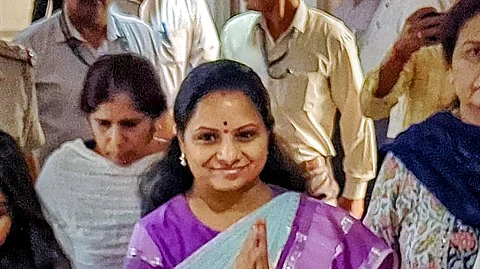

New Delhi | In a relief to BRS leader K Kavitha, the Supreme Court on Tuesday granted her bail in corruption and money laundering cases linked to the alleged Delhi excise policy scam, while questioning the central agencies over the fairness of their probe and asking if they were free to "pick and choose" an accused.
The apex court said Kavitha's custody was no longer required as both the Central Bureau of Investigation (CBI) and the Enforcement Directorate (ED) have completed their probe against her. The Bharat Rashtriya Samithi (BRS) lawmaker from Telangana has been in jail for over five months.
A bench of Justices B R Gavai and K V Viswanathan noted since 493 witnesses were to be examined and 50,000 pages of documents were to be considered in the two cases, there was no likelihood of the trial being concluded in the near future.
"The appellant (Kavitha) is directed to be released forthwith on bail … on furnishing bail bonds in the sum of Rs 10 lakh in each of the cases," the bench said, while allowing her appeals against the July 1 verdict of the Delhi High Court which had denied her bail in the two cases.
Later in the day, a Delhi court issued release warrants for Kavitha, paving the way for her release from jail.
While quashing the high court verdict, the apex court said Kavitha shall not make any attempt to tamper with evidence or influence the witnesses and shall deposit her passport with the trial judge.
It said she shall regularly attend the trial court proceedings and cooperate to ensure expeditious disposal of the trial.
The two federal agencies came in for some sharp criticism over the "fairness" of their investigation, with the apex court observing "Sorry to see this state of affairs".
"You will pick and choose anyone?" it asked, while referring to one of the witnesses whose statements were read out in the court during the arguments.
"The prosecution has to be fair. You can't pick and choose anyone. What is this fairness? A person who incriminates himself has been made a witness," the bench said, adding, "Tomorrow you will pick up anyone as you choose and leave anyone as you choose as an accused? Very fair and reasonable discretion!"
When Additional Solicitor General S V Raju, appearing for the probe agencies, referred to some witnesses who have claimed Kavitha's involvement in the alleged scam, the court told him it would be compelled to "observe everything" if he tried to pull it into the details.
"We will have to observe about the fairness and impartiality of the investigating agencies," it said, adding, "If you want those observations, you argue more".
The bench also dealt with the observations made by the high court on whether Kavitha was entitled to benefit from the proviso to section 45 of the Prevention of Money Laundering Act (PMLA) being a woman.
Section 45 of the PMLA provides for the twin conditions which are required to be satisfied before granting bail to an accused under the anti-money laundering law. The twin conditions are that the judge should be prima facie satisfied that the accused has not committed the offence and that he is not likely to commit any offence while on bail.
The high court had noted in its verdict that the proviso provides the exception to the general rule if the accused is a woman.
The bench said day in and day out, it was argued before the court by the prosecution that all accused should be treated equally irrespective of whether they are a chief minister or a lawmaker.
"However, the single judge (of the high court) in the present case, while denying the benefit of proviso to section 45 (1) comes to a heartening conclusion that the appellant (Kavitha) is a highly qualified and well-accomplished person, having made significant contributions to politics and social work…," the bench noted.
It said the high court proceeded to observe that Kavitha can't be equated to a "vulnerable woman".
The bench, which referred to an earlier judgement delivered by the top court, said the high court had "totally misdirected" itself while denying the benefit of the proviso to Kavitha.
It noted that in the earlier verdict, the apex court had not said that merely because a woman was highly educated, sophisticated or a lawmaker, she should be denied the benefit of the proviso.
During the hearing, the bench said it would set aside these observations of the high court as it would at least apply to all courts in the jurisdiction of Delhi and might mean that no educated woman can get bail.
Senior advocate Mukul Rohatgi, appearing for Kavitha, argued that the probe against her was complete and the charge sheet and prosecution complaint have already been filed.
He also referred to the August 9 apex court verdict granting bail to co-accused and senior AAP leader Manish Sisodia in the two cases.
Raju claimed that Kavitha had destroyed/formatted her mobile phone and her conduct amounted to tampering with evidence.
Rohatgi, who termed the allegation as "bogus", said Kavitha had given some of her old phones to her staff as she upgraded her equipment.
The ED had arrested Kavitha (46) from her Banjara Hills residence in Hyderabad on March 15 and the CBI arrested her from Tihar jail on April 11.
Kavitha, the daughter of former Telangana chief minister K Chandrashekar Rao, has been accused of being part of the 'South Group', a cartel of businessmen and politicians, which allegedly paid kickbacks of Rs 100 crore to Delhi's ruling AAP in return for liquor licences. She has denied all allegations.
